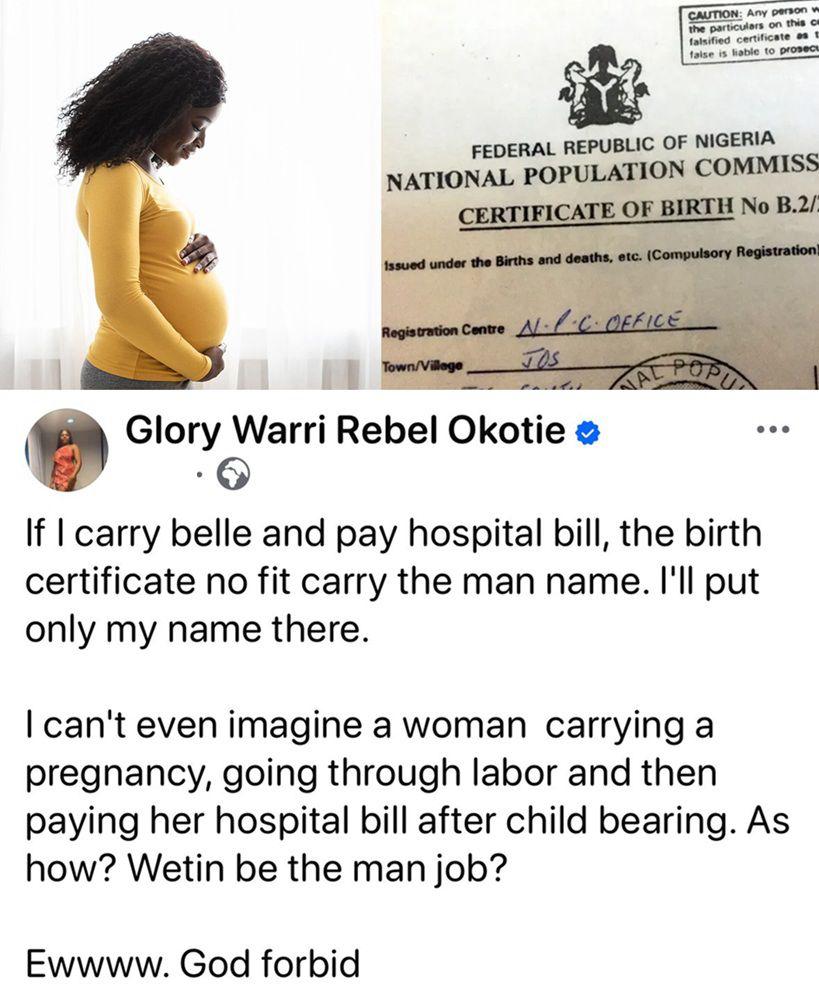
"If I Pay the Hospital Bill, His Name Won’t Be There” — Nigerian Woman Sparks Debate Over Birth Certificate Rights

A bold declaration made by a Nigerian woman, identified as Glory Warri Rebel Okotie, has ignited a wave of online debates over parental responsibility, financial obligations during childbirth, and the rights of fathers to be named on a child’s birth certificate. In a post that has since gone viral, Glory took a firm stand on a scenario that many women in Nigeria and around the world might quietly ponder but never publicly express.
“If I carry belle and pay hospital bill, the birth certificate no fit carry the man name. I’ll put only my name there,” she stated, unapologetically. Her words, delivered in a mix of Nigerian Pidgin and English, were met with both applause and condemnation as they spread like wildfire across social media platforms.
For many women, the emotional, physical, and financial toll of pregnancy and childbirth is already overwhelming. Glory’s post seemed to strike a nerve, especially among women who have had to shoulder the burden of motherhood alone. Her perspective places the responsibility of fatherhood not only in biological contribution but in being physically, emotionally, and financially present — particularly during childbirth.
“I can’t even imagine a woman carrying a pregnancy, going through labor and then paying her hospital bill after childbearing,” she added, reinforcing her stance. “As how? Wetin be the man job? Ewwww. God forbid.”
While some critics argue that her position is extreme, many supporters say her message is a wake-up call for men who abandon their responsibilities once conception occurs. For them, it’s not just about the money — it’s about respect, accountability, and the true meaning of fatherhood.
In Nigeria, where patriarchal norms often dominate social structures, Glory’s declaration is nothing short of revolutionary. The idea of a woman intentionally excluding a man’s name from a birth certificate, particularly when the child is biologically his, is bound to rattle deeply rooted traditional values. Birth certificates in Nigeria are official legal documents issued by the National Population Commission (NPC), and though it is not uncommon for some children to bear only their mother’s name, it is typically due to absenteeism, separation, or unknown paternity — not as an act of protest or principle.
But Glory’s statement is not about absentee fathers in the traditional sense — it’s about the lack of financial contribution during a critical and vulnerable moment in a woman’s life. She makes a case that a father who cannot or does not assist financially with childbirth has forfeited his right to be legally recognized on the child’s official documents.
Her words have opened up a larger conversation around modern co-parenting and gender roles in Nigerian society. Many women echoed her sentiments, sharing their own experiences of being left alone to navigate pregnancy, labor, and delivery — all while covering the costs themselves. Some even described situations where men vanished after the announcement of pregnancy, only to reappear months later expecting full parental rights.
However, not everyone agrees with her approach. Some commentators argue that denying a father legal recognition on a child’s birth certificate could have long-term consequences for the child, especially when it comes to inheritance rights, nationality issues, and parental support. They insist that while men should be held accountable, children should not be caught in the middle of adult grievances.
Still, the underlying frustration expressed by Glory is impossible to ignore. Her words reflect a growing discontent among women who feel overburdened and unsupported in their roles as mothers. In a country where maternal healthcare is often underfunded, and where many women give birth in challenging conditions with little or no assistance from the fathers of their children, her message hits home.
The post also raises questions about what defines true fatherhood in today’s world. Is it enough to simply share DNA with a child, or must it be earned through presence, support, and partnership? For many women like Glory, the answer is clear: fatherhood must be backed by action — not just biology.
Reactions to the post have shown a clear generational divide. Older Nigerians often lean toward traditional views, emphasizing family unity and patriarchal roles regardless of financial contributions. Younger Nigerians, especially women, are increasingly rejecting these norms, demanding shared responsibility and equity in parenting. To them, Glory’s post is not an attack on men, but a call to rethink outdated expectations.
Some have even suggested that Glory’s declaration is emblematic of a broader cultural shift. With more women gaining financial independence, higher education, and access to reproductive health information, the dynamics of relationships and parenting are evolving rapidly. Women are no longer afraid to demand more — emotionally, financially, and legally — from the men they have children with.
In the heat of the controversy, a few legal experts have weighed in, noting that while a mother can list only her name on a birth certificate, doing so does not legally bar a father from seeking recognition or parental rights through the courts. However, such actions can be time-consuming, costly, and emotionally draining — a reality that many men would rather avoid, especially if they have not been involved in the child’s life from the start.
For now, Glory Warri Rebel Okotie’s post remains a stark reminder of the challenges many women face when they walk the path of motherhood alone. Whether one agrees with her or not, she has undeniably sparked an important conversation about responsibility, recognition, and respect — one that is long overdue in many societies.
As the debates continue online, one thing is certain: the era of silent suffering for women might be coming to an end. Voices like Glory’s are growing louder, and they are demanding to be heard — not just in social media threads, but in the very systems that govern how families are formed, recognized, and supported.


